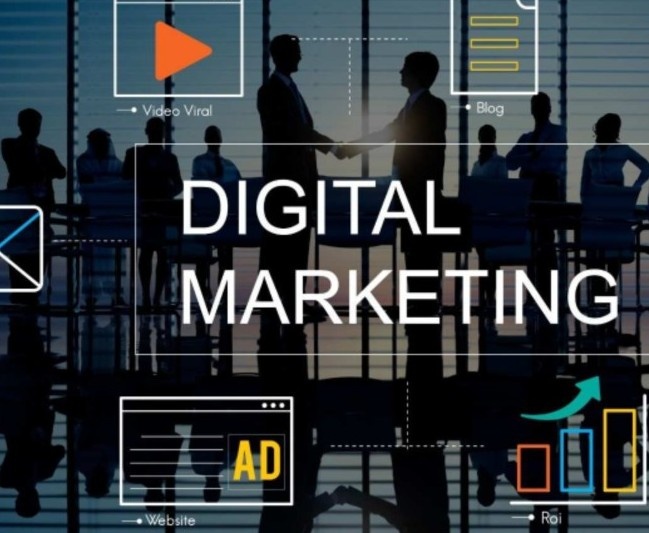In the realm of modern marketing, where the digital landscape reigns supreme, one tool has emerged as a powerhouse, driving strategies, shaping decisions, and revolutionizing outcomes: data analytics. In this digital age, where every click, scroll, and purchase leaves a digital footprint, harnessing the potential of data analytics in digital marketing is not just advantageous; it's imperative.

Understanding the Landscape:
Before delving into the intricate web of data analytics and its symbiotic relationship with digital marketing, it's crucial to grasp the context of the contemporary marketing landscape. Gone are the days of traditional marketing methods reigning supreme. While TV ads, billboards, and print media still hold a place in the marketing mix, their influence has been overshadowed by the vast reach and precision targeting capabilities of digital marketing channels.
In the dynamic landscape of modern marketing, the role of data analytics in digital marketing extends far beyond mere optimization and efficiency. It serves as the cornerstone of strategic decision-making, guiding marketers in crafting personalized experiences, predicting future trends, and shaping the very essence of consumer engagement. By delving deeper into consumer behavior, preferences, and sentiment, data analytics empowers marketers to cultivate meaningful relationships with their audience, foster brand loyalty, and drive sustainable growth. In essence, data analytics not only amplifies the impact of digital marketing efforts but also transforms them into a dynamic and ever-evolving journey of discovery and innovation.
The Nexus of Data and Marketing:
At the heart of digital marketing and data analytics lies a symbiotic relationship—one that fuels innovation, optimizes performance, and unlocks unprecedented growth opportunities. But why does data analytics for digital marketing matter, and what sets it apart from traditional marketing methodologies?
Precision Targeting:
In the digital realm, understanding your audience is paramount, and that's where data analytics comes into play. By leveraging consumer data—ranging from demographics and browsing behavior to purchase history and preferences—marketers can create highly targeted campaigns tailored to individual interests and needs. This level of precision targeting not only enhances the relevance of marketing messages but also maximizes the likelihood of conversion, driving tangible results for brands.
Actionable Insights:
In the age of information overload, raw data holds little value without the ability to extract actionable insights. Herein lies the power of data analytics in digital marketing. By employing advanced analytics techniques—such as predictive modeling, sentiment analysis, and cohort analysis—marketers can unearth hidden patterns, identify emerging trends, and anticipate consumer behavior with unprecedented accuracy. Armed with these insights, brands can make informed decisions, refine their strategies in real-time, and stay ahead of the curve in an ever-evolving digital landscape.
Optimization and Efficiency:
In the realm of marketing, every dollar spent must yield a return. Yet, without the guiding light of data, optimizing marketing campaigns and allocating resources effectively can feel like shooting in the dark. Data analytics changes the game by providing marketers with the tools they need to measure performance, track key metrics, and attribute conversions across various touchpoints. Through A/B testing, multivariate analysis, and attribution modeling, marketers can fine-tune their campaigns, allocate budgets strategically, and maximize ROI with surgical precision.
Personalization at Scale:
In an era where consumers crave personalized experiences, brands that can deliver tailored content and recommendations hold a distinct competitive advantage. Herein lies the promise of data analytics for digital marketing—the ability to achieve personalization at scale. By harnessing machine learning algorithms, segmentation strategies, and real-time data processing, marketers can dynamically adapt their messaging, offers, and product recommendations to suit the unique preferences of each individual consumer. The result? Heightened engagement, increased loyalty, and ultimately, sustainable growth for brands.
The Evolution of Data Analytics:
As data analytics continues to evolve, so too does its role in shaping the future of digital marketing. What began as a tool for descriptive analysis—retrospectively examining past performance and trends—has now evolved into a predictive and prescriptive powerhouse, capable of shaping outcomes and driving proactive decision-making.
Descriptive Analytics:
Descriptive analytics forms the foundation of data analytics in digital marketing, providing marketers with a retrospective view of past performance and trends. By analyzing historical data—such as website traffic, social media engagement, and conversion rates—marketers can gain valuable insights into what has worked well in the past, what hasn't, and where opportunities for improvement lie. While descriptive analytics alone may offer limited strategic value, it lays the groundwork for more advanced analytics techniques, setting the stage for predictive and prescriptive analysis.
Predictive Analytics:
Predictive analytics takes data analytics to the next level, enabling marketers to forecast future trends, behaviors, and outcomes with a high degree of accuracy. By leveraging statistical modeling, machine learning algorithms, and data mining techniques, marketers can identify patterns, correlations, and causal relationships within vast datasets, allowing them to anticipate consumer behavior, market trends, and competitive dynamics before they unfold. Whether predicting customer churn, forecasting demand, or optimizing pricing strategies, predictive analytics empowers marketers to stay one step ahead in an increasingly competitive landscape.
Prescriptive Analytics:
Prescriptive analytics represents the pinnacle of data analytics sophistication, offering actionable insights and recommendations to drive proactive decision-making. Unlike descriptive and predictive analytics, which focus on understanding and anticipating outcomes, prescriptive analytics goes a step further by recommending specific actions to achieve desired outcomes. By simulating different scenarios, conducting what-if analyses, and optimizing decision variables, prescriptive analytics empowers marketers to make data-driven decisions with confidence, mitigating risks, and maximizing opportunities for success.
The Future of Data-Driven Marketing:
As digital marketing and data analytics continue to converge, the future promises even greater innovation, transformation, and disruption. From the rise of artificial intelligence and machine learning to the proliferation of IoT devices and the advent of blockchain technology, the possibilities are endless. Yet, amidst the technological upheaval, one thing remains clear: data analytics will remain the cornerstone of digital marketing success.
Artificial Intelligence and Machine Learning:
Artificial intelligence (AI) and machine learning (ML) are poised to revolutionize data analytics in digital marketing, enabling marketers to achieve unprecedented levels of personalization, automation, and efficiency. From chatbots and virtual assistants to recommendation engines and predictive analytics platforms, AI and ML technologies are reshaping the way marketers engage with consumers, optimize campaigns, and drive conversions. By harnessing the power of algorithms that learn and adapt over time, marketers can deliver hyper-targeted experiences that resonate with consumers on a profound level, fostering loyalty, advocacy, and brand affinity.
Internet of Things (IoT):
The Internet of Things (IoT) represents a paradigm shift in data analytics for digital marketing, ushering in an era of connected devices, smart sensors, and real-time data streams. From wearable devices and smart appliances to connected cars and industrial machinery, the proliferation of IoT devices is generating a wealth of data that holds immense potential for marketers. By tapping into this treasure trove of connected data, marketers can gain unparalleled insights into consumer behavior, preferences, and habits, enabling them to deliver personalized experiences, optimize supply chains, and drive innovation across the entire customer journey.
Blockchain Technology:
Blockchain technology has emerged as a game-changer in digital marketing and data analytics, offering a decentralized, immutable ledger that ensures trust, transparency, and security in an inherently trustless environment. By leveraging blockchain technology, marketers can verify the authenticity of data, track the provenance of content, and eliminate fraudulent activities such as ad fraud and bot traffic. Moreover, blockchain-enabled smart contracts empower marketers to establish trustless agreements and automate transactions, streamlining processes, and reducing costs while ensuring compliance with regulations such as GDPR and CCPA.
Conclusion:
In conclusion, the role of data analytics in digital marketing cannot be overstated. From precision targeting and actionable insights to optimization and efficiency, data analytics serves as the backbone of modern marketing strategies, empowering brands to connect with consumers in meaningful ways, drive tangible results, and stay ahead of the curve in an increasingly competitive landscape. As technology continues to evolve and consumer expectations continue to rise, the future belongs to those who embrace the data-driven revolution, harnessing the power of to unlock new opportunities, drive innovation, and shape the future of marketing in the digital age.
